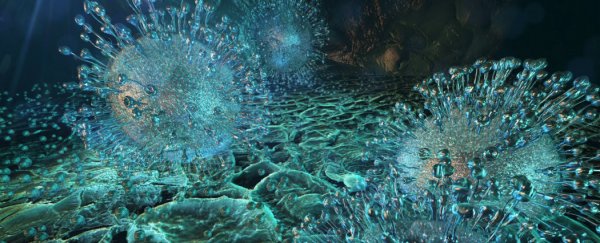A new drug candidate is so potent against all strains of HIV, researchers think it could work as a new kind of vaccine.
Developed by researchers from more than a dozen research institutions and led by a team at the Scripps Research Institute in the US, the drug is effective against doses of HIV-1, HIV-2 and SIV (simian immunodeficiency virus) that have been extracted from humans or rhesus macaques - including what researchers consider to be the 'hardest-to-stop' variants. It worked against doses of HIV that are way higher than what would be transmitted between humans, and works for at least eight months after injection.
"Our compound is the broadest and most potent entry inhibitor described so far," lead researcher Michael Farzan from the Scripps Institute said in a press release. "Unlike antibodies, which fail to neutralise a large fraction of HIV-1 strains, our protein has been effective against all strains tested, raising the possibility it could offer an effective HIV vaccine alternative."
While traditional vaccines work by delivering a tiny, weakened dose of a virus to train your immune system to thwart an actual attack, this drug does something quite different. The way HIV infects a person is by targeting their T lymphocytes - a very specialised type of white blood cell - and injecting its own genetic material inside to transform them into HIV-producing machines. So, quite literally, it turns our immune systems against us.
But what Farzan's team has discovered is that a particular type of protein found on the surface of white blood cells can actually bind to the surface of the HIV virus in two different places simultaneously, which means that not only does the virus no longer have a chance to change the position of its receptors to escape, it's also being blocked from entering the T lymphocyte cells.
"When antibodies try to mimic the receptor, they touch a lot of other parts of the viral envelope that HIV can change with ease," said one of the team, Matthew Gardner, from the Scripps Institute. "We've developed a direct mimic of the receptors without providing many avenues that the virus can use to escape, so we catch every virus thus far."
According to James Gallagher at BBC News, the vaccine would be delivered via a weak, harmless type of virus that would introduce a section of DNA to a patient's healthy muscle cells, containing instructions for how to produce this HIV-blocking protein. The protein would then be pumped out into the bloodstream over and over, protecting the patient from being infected over several months. The team reported in Nature that the effects of the drug lasted for at least 34 weeks in their monkey subjects, but they think they could get it to last for years, perhaps even decades.
"We are closer than any other approach to universal protection, but we still have hurdles, primarily with safety for giving it to many, many people," Franzen told the BBC. One such concern is that no one really knows what the long-term implications would be for a person who is having an anti-HIV response being pumped around their body non-stop. The team will be looking into this when they get their human trials underway.
"In the absence of a vaccine that can elicit broadly protective immunity and prevent infection, and given the lack of major breakthroughs on the horizon to provide one, the idea of conferring potent, sustained vaccine-like protection against HIV infection through gene therapy is certainly worth strong consideration," Nancy Haigwood from the Oregon Health & Science University in the US, who wasn't involved in the study, told the BBC.
Source: BBC News
